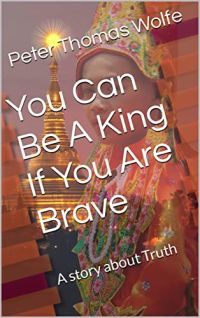You Can Be A King If You Are Brave (book)

You Can Be A King If You Are Brave by Peter Thomas Wolfe published in 2023. Peter T Wolfe is an independent author. This is his premier novel which has been described as, "a perplexing one that raises challenging issues about intergenerational relationships." [1]
Description
Is there any entirely self-evident truth? Set in Melbourne, Australia and then Burma at the turn of the last century, You Can Be A King If You Are Brave raises this dilemma through the eyes of Adam Townsend, a beguiling adolescent boy from a wealthy family in Melbourne, Australia.'
Outwardly Adam is blessed with sublime good looks and a keen intellect, yet he struggles with family problems caused by an abusive father. Adam begins to build a relationship with Geoffrey Lang, one of the most charismatic teachers in his new school, Wellington Grammar, an exclusive boys' college. Geoff understands the problems Adam is facing. He accepts him into the school bushwalking group, through which Adam builds friendships with his peers and opens up to Geoff about his struggles. The bond between student and teacher develops in ways that neither expects but is brought to a tragic and senseless end."
As a man, Adam finally discovers his purpose, working to curtail poverty in exotic Burma, a country locked in the depths of a military dictatorship. In Rangoon, he discovers things about himself that have remained hidden and suppressed, brought to light through friendship with a group of adolescent boys from the streets and one in particular who steals his heart.
This book raises questions about the ambiguity of our ever-more polarising definitions of love and abuse. It is a simple story about complex issues. One that asks us to look beyond the hysteria surrounding inter-generational relationships and understand that truth is not always as straightforward as we might like it to be.[2]
Excerpt
"From the rostrum, Principal Irving DeWitt called his name, ‘Mr Lang, do come forward.’ A hush fell over the assembly as the boys, who had just given a cheer for the first eighteen’s victory over Scots College, quickly re-focussed their attention on the podium. Geoff moved to the rostrum to join the principal.
‘It is my utmost pleasure to bestow upon you this Award for Excellence. There are few who, in so short a time, have made such an impact on our school. I am sure many of our boys here will testify to that.’ There was a hum from the auditorium. Geoff gazed down and saw the smiles and nods of agreement. DeWitt continued, ‘You certainly have a knack for dealing with, how should I put it, the most challenging situations. Not everyone has an easy ride, and our school community is not spared the sometimes harsh realities of life. Therefore, I want to publicly appreciate your service to many of our boys who might otherwise have struggled to remain productive members of our student body.’
Studying the young faces below, Geoff saw smiles turn solemn. Some boys smothered embarrassed giggles. One or two poked their neighbour in the ribs accusatorily. ‘Silence boys,’ Principal DeWitt intoned and as if by remote, a hush returned, and DeWitt continued. But Geoff was no longer listening. Instead, he gazed down at the crowd of young men seated before him. They were arranged by class, neatly dressed in blue and red striped school blazers and short grey trousers. As he scanned the auditorium from front to rear, his attention focussed on forms two and three towards the front. These were the classes he was most fond of; boys as young as twelve and no older than fifteen. As DeWitt continued, Geoff picked out the faces of those he had come to know through the bushwalking club. Finding Adam, the group’s most recent member, took only a few moments. Then DeWitt’s words brought his attention back, ‘Please, a huge round of applause to Mr Geoffrey Lang.’ The framed certificate was thrust into his hands, and a huge cheer rose from the youthful crowd. Geoff returned to his seat.
Now the certificate hung on his wall, and he continued to stare at it. Was it altruism or simply sexual desire?...”[3]
References
See also
- A review of You Can Be A King If You Are Brave by Peter Thomas Wolfe
- Reading list category literature
External links
- You Can Be A King If You Are Brave (available at Amazon)